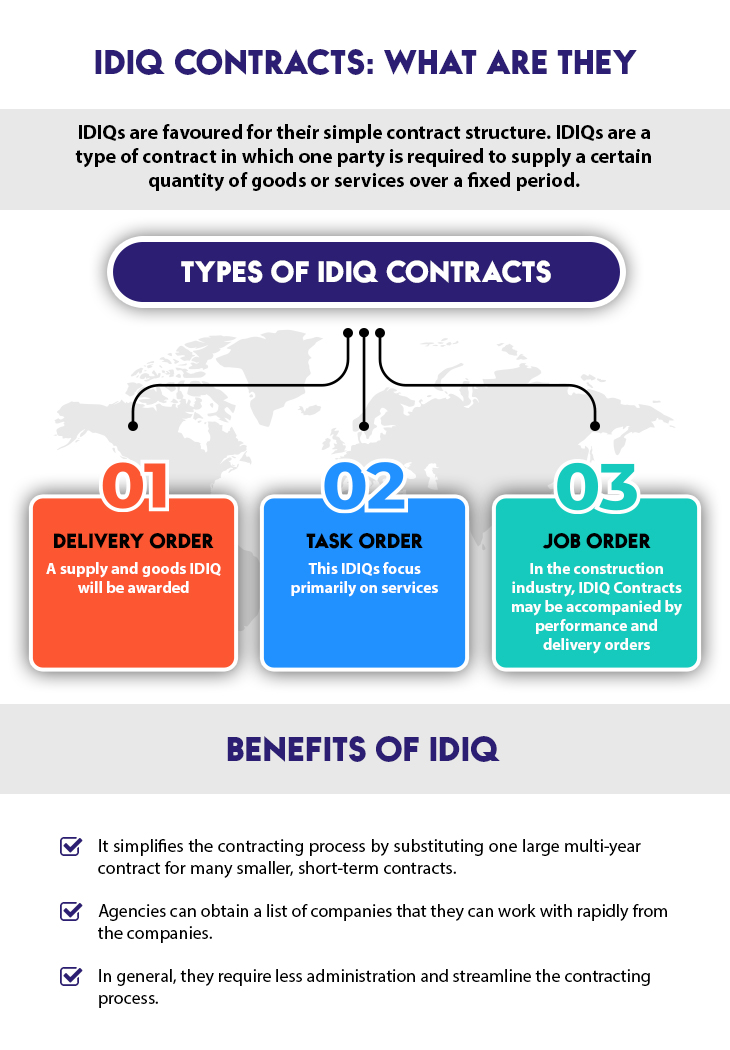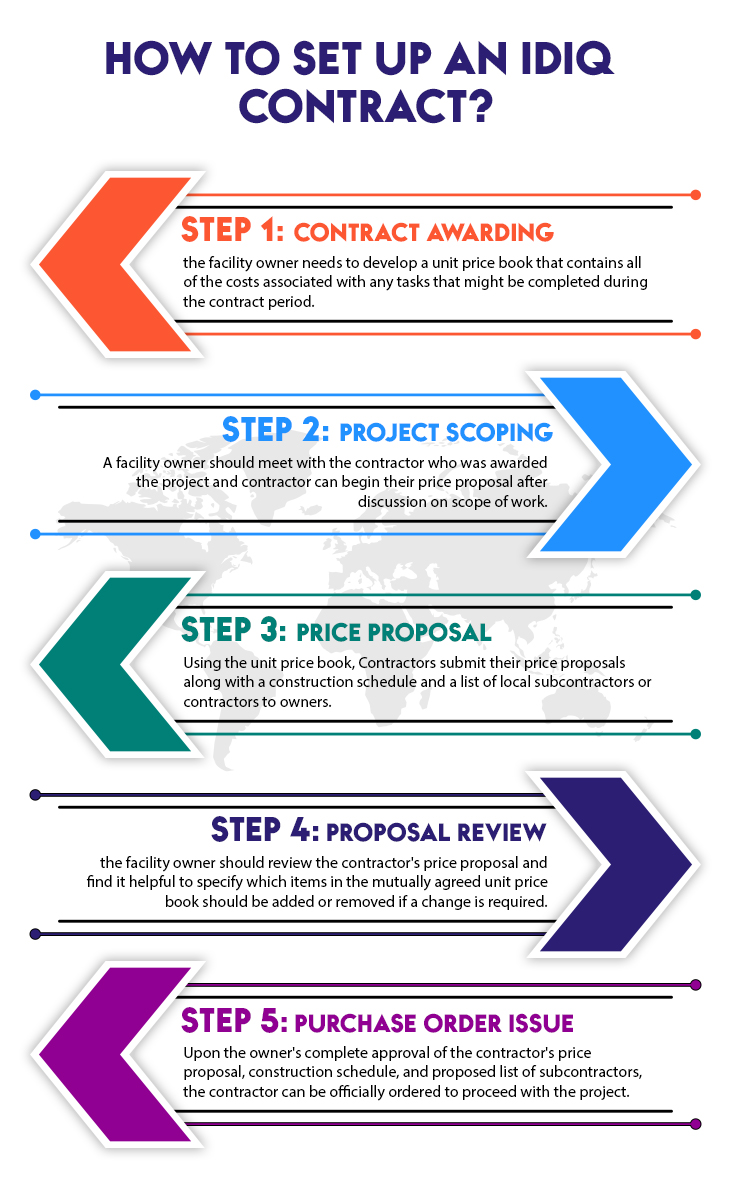
U.S. federal government contracts are referred to as IDIQ Contracts. An indefinite quantity of supplies or services is provided for a fixed period under this type of contract. In the Federal Acquisition Regulation (FAR), section 16.504(a) defines IDIQ Contracts as contracts awarded to one or more vendors for fulfilling supply and service orders. Indefinite Delivery Contracts (IDC) is a subtype of IDIQ Contracts, which are awards by the government to one or more contractors.
IDIQ Contracts: What Are They and What Are Their Benefits?
IDIQs are a type of contract in which one party is required to supply a certain quantity of goods or services over a fixed period. A typical contract doesn’t last longer than five years, with the option to extend if necessary. It is still reasonable for contractors to set reasonable thresholds despite the use of the term “indefinite.”. With this contract, the government gains access to technical expertise around areas like construction, repairs, electric work, and architectural design.
Benefits of IDIQ
IDIQs are favoured for their simple contract structure. It is already apparent that the supplier company benefits from a contract since it receives less money than it would have to pay to fulfil the contract.
The following are other IDIQ benefits:
- It simplifies the contracting process by substituting one large multi-year contract for many smaller, short-term contracts.
- Agencies can obtain a list of companies that they can work with rapidly from the companies.
- In general, they require less administration and streamline the contracting process.
What Are the Types Of Indefinite Delivery Contracts?
Often referred to as IDIQ Contracts, work order contracts are classified according to the work they accomplish, such as:
- Delivery order: A supply and goods IDIQ will be awarded. IT infrastructure, for instance, was procured through an IDIQ Contract.
- Task order: This IDIQs focus primarily on services. A government agency, for example, might have a contract for providing Mail and General Support Services.
- Job order: In the construction industry, IDIQ Contracts are used, which may be accompanied by performance and delivery orders (work orders may also be applicable). Building a bridge, a road, or various infrastructures are examples.
The following terms can also be used to classify them, such as :
- Definite quantity contract: A contract in which supplies or services are required to be delivered for a specific period, with deliveries or performance occurring at locations specified in each task order. This contract is suitable if the supplies or services are already available or can be provided very quickly.
- Indefinite quantity contract: A specific period is specified within certain minimums and maximums to provide an indefinite quantity of supplies or services. The conditions are determined by the government according to the needs.
- Requirements contract: During the period of the contract, supplies, and services needed for the successful performance of government activities will be purchased. Deliveries will be determined by the contracting authority.
 Why Use an IDIQ Contract?
Why Use an IDIQ Contract?
The government uses these contracts when it cannot accurately predict the quantity or time of a recurring need for supplies and services. Several types of work can be performed under this contract for flexible working. These include architecture and design, consulting, public transportation, information technology, research and development, and aviation. While responding to natural calamities and following them, the US government uses these contracts.
How Does IDIQ Contract Work?
It may seem daunting that the word indefinite can be used in Indefinite delivery/indefinite-quantity (IDIQ), but a minimum and maximum quantity limit are defined, either by quantity or value.
A government agency and a private or public company enter into this type of contract when they are unable to predict the precise quantity or exact timing of the need for the product or service
How Do I Set Up An IDIQ Contract?
For specific IDIQs, there may be deviations from this process. However, these steps are largely part of pre-construction.
Step 1: Contract Awarding A contract with an IDIQ is pre-competed, which means it is put out to bid before specific projects are identified. For this to be possible, the facility owner needs to develop a unit price book that contains all of the costs associated with any tasks that might be completed during the contract period. After this, contractors submit bids by proposing adjustment factors to the line items of the unit price book.
Step 2: Project Scoping A facility owner should meet with the contractor who was awarded the project to discuss the scope of work. A contractor can begin their price proposal after the owner and contractor have agreed on the details of the project.
Step 3: Price Proposal Using the unit price book, the contractor chooses the appropriate tasks to include in their price proposal. Contractors submit their price proposals along with a construction schedule and a list of local subcontractors or contractors to owners.
Step 4: Proposal Review To ensure that only appropriate work and quantities have been selected, the facility owner should review the contractor’s price proposal. An owner will find it helpful to specify which items in the mutually agreed unit price book should be added or removed if a change is required.
Step 5: Purchase Order Issue Upon the owner’s complete approval of the contractor’s price proposal, construction schedule, and proposed list of subcontractors, and upon receipt and approval of any additional required documentation (ex. bonds, insurance certificates, etc.), the contractor can be officially ordered to proceed with the project.

How to Get an IDIQ Contract?
Recent changes have been made to what IDIQ means to the Department of Defence (DoD), GSA schedule contract, and NASA. In accordance with Section 825, a solicitation for multiple-award contracts to be awarded for the same or similar services AND stating the government intends to award contracts to each qualifying offeror is not governed by the rule requiring price or cost as an evaluation factor. The Contracting Officer will consider price or cost as a factor when awarding contracts if neither was assessed during the award process.
IDIQ Contract Pros and Cons
Over the years, the following advantages have been found:
1. In the federal procurement process, ordering is more convenient administratively than new procurements,
2. As in the private sector, pre-qualification of sources and working with a very small number of offerors are opportunities, and
Making a nice ordering process by evaluating the workload and past performance on the orders.
Here are a few things to keep in mind that are not really disadvantages:
1. A minimum amount of items must be acquired for contracts with qualified suppliers.
2. There needs to be a thorough review of the selection of potential sources to make sure that there is actually more than one competitor available for these orders.
3. It is important to develop an ordering process to benefit from the administrative convenience that this type of procurement offers.
IDIQ Contract for Services
A modernization, reduction of costs, and improvement of efficiency are among the ways the Department of Defence (DoD) has improved its procurement of goods and services. The use of IDIQ Contracts, which are characterized by their flexibility in federal contracting, is widespread in this context. The purpose of IDIQ Contracts is for agencies to purchase supplies and/or services when the exact delivery times and/or quantities are not known at the time of the contract award.
